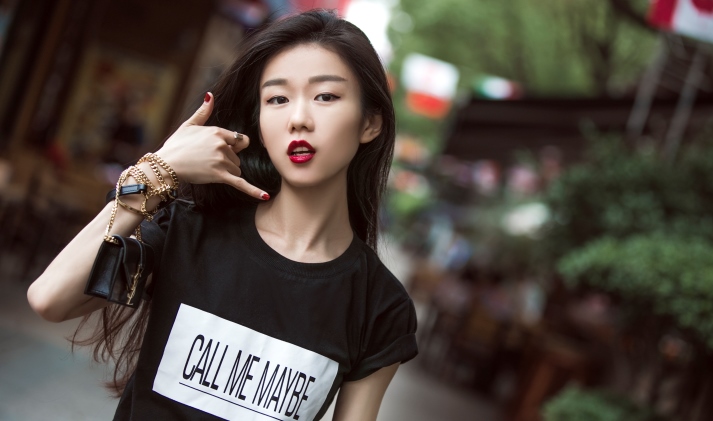
Ava Foo is almost famous. Although she has never starred in a blockbuster movie, doesn’t have a hit single to point to, and won’t be competing in this summer’s Olympics, the 29-year-old Shanghai resident has amassed some 320,000 followers on Chinese microblogging site Weibo, a fan base large enough to qualify her as a bonafide member of China’s growing roster of cyber celebrities.
Her fame, which exists almost solely online, seems to surprise her, since it grew out of the most common of digital activities: a few years ago, she posted lots of pictures of herself on social media wearing her favorite designer clothes. Her fetching poses and upscale taste struck a chord with other fashionistas. It wasn’t long before long Foo’s photos were showing up on the websites of fashion magazines such as Vogue and Elle, and not long after that Foo was modeling for Louis Vuitton, Chanel, Gucci and Estee Lauder.
“I am touched when I see people collect all my photos, write letters to me, and comment on every one of my posts online,” Foo says with the modesty of a young woman who can’t quite get her head around her fame. “Some even request paw signatures of my dog.”
Foo needn’t be too surprised. Since the Internet has been around, anonymous individuals have been going online to showcase their talents, broadcast their opinions and publicize their epic fails, parlaying exposure into thousands—and on rare occasions (cough, Bieber, cough) even millions—of followers.



In China, though, where conventional celebrity is hard to come by and social media is a mania, the internet has become almost a cyber-celebrity factory, churning out thousands of demi-personalities like fashion model Foo, society pundits and armchair experts on topics of all stripes from fishing to football.
For many, fame is fleeting and at best only emotionally rewarding. But others are figuring out ways to monetize their followers and turn notoriety into a career.
In April, an online-video star named Papi Jiang, known for her sarcastic social commentary on her Weibo page, auctioned off her services as a spokesmodel to the highest corporate bidder. Chinese cosmetics retailer Lily & Beauty placed the winning bid—at $3.4 million—for which the company will receive a one-time promotion during one of Papi Jiang’s videos and mention on her social media accounts.
Jiang’s auction is just one example of a larger market for cyber celebrities that research firm CBNData predicts will reach RMB 58 billion ($8.83 billion) this year, including endorsement fees and commissions earned by spokespersons for merchandise sales.
Indeed, what started as a grassroots phenomenon is becoming an industry unto itself as retailers and manufacturers seek to harness the marketing power of cyber celebrityhood. For example, e-commerce giant Alibaba Group, which runs China’s largest shopping websites, is trying to make it easier for cyber celebrities to connect with hundreds of millions of online shoppers, at the same time linking merchants selling on its sites to spokespersons to boost online sales.
Last year Alibaba rolled out a program to encourage bloggers, writers and online experts to post content on various channels on Mobile Taobao, China’s most popular mobile-shopping app. Under the program, online experts earn commissions by making product recommendations. Alibaba is able to track who views content and whether those views generate sales. The company says it expects the program to generate RMB 2 billion ($305 million) in total commissions in its first three years.
One of the program’s beneficiaries is Zhao Chao, a sport-fishing expert and “Taobao celebrity” who earned more than RMB 10,000 ($1,524) in April alone by posting angling stories and tips as well as product recommendations on Mobile Taobao. Taobao celebrities “play the role of a bridge to connect merchants and consumers, helping merchants to understand real needs of customers,” Zhao says. “We start as consumers so we understand consumers. We know what they want.”
This form of marketing may seem foreign to Westerners who are more accustomed to celebrity endorsements coming from genuinely famous sports, music and movie stars. But in China, online social engagement and shopping behavior are so intertwined that Chinese shoppers rank their friends’ recommendations—both online and offline—as the most important factor in their online buying choices, according to global management consultancy McKinsey. And “friends” often include trusted voices that consumers follow online, even if they have never met them in person.
“The younger generation in China spends lots of time on their mobile phones and on social media,” says Chen Lei, a manager at Mobile Taobao. “Cyber celebrities are strong personalities and thought leaders who show others products that fit their attitudes. They fit right in with [the mobile and social] trend.”
Taobao is riding this trend by turning its mobile shopping app into a full-blown lifestyle channel, with content at the heart of the strategy. By encouraging brands to increase their engagement with consumers through content, consumers come to better understand the brands and, ultimately, spend more time on Taobao. Last month, Mobile Taobao opened another channel—live streaming of video content–by adding a feature that allows video bloggers to post fashion tips, fitness advice, dining recommendations and other material on the app. The feature is aimed at creating “more exciting interaction between merchants and consumers,” Chen said.



Cyber celebrities aren’t just cashing in by acting as spokespersons. Foo is one of many online celebrities who have decided to launch their own businesses. She recently partnered with fellow Shanghai-based fashion blogger Nikki Min to start a designer brand called Ava & Nikki, which they sell through Taobao among other channels. Sales are still small, however Foo says that as they continue to model their clothes online the products are quickly selling out.
Likewise, fitness expert Chen Nuanyang has leveraged an online base of 750,000 Weibo followers into a Taobao store that produced RMB 14 million ($2.1 million) in sales last March, up from just a few thousand yuan a month when she launched two years ago. The 26-year-old Huzhou, China, native now runs a business that employs 154 people.
Content, celebrity advice and sales are crucial to the success of the operation. Chen airs a live video broadcast each week on her Weibo page that regularly gets more than 80,000 viewers. Fans log on to learn as much about abdominal crunches and yoga poses as they do her latest line of workout togs. “I have a lot of fans so I’m able to hear different voices,” she says. “They tell me what they want and what service they expect so I can improve my brand.”
Yet when asked about her online fame, Chen demurs. “I don’t like it when people call me a cyber celebrity,” she says. “Just call me Nuanyang, a girl who loves sports and owns a Taobao shop to sell quality sportswear.”
Chen is smart to maintain a woman-of-the-people profile. Like other cyber celebrities, she says she recognizes the relationship with fans can be fragile because it is built on trust. Nobody likes a sellout. Choose the fast yuan over the interests of followers, and fame can quickly go the way of a certain Miss Teen USA contestant.
Fashion bloggers Foo and Min admit that they regularly get free clothes, bags, shoes and cosmetics from brands for “testing,” and that those are the products that typically get promoted on their Taobao or Weibo pages. But only the best products get their approval, they insist. And their recommendations list isn’t exclusive to global names like Gucci and Chanel. Smaller labels are just as likely to get one of their much sought-after nods.
“If we like it, we will promote it,” Foo says. “We turn down big brands all the time.” Because without her loyal band of several hundred thousand followers, Foo isn’t almost famous—she’s just another face in the crowd.




